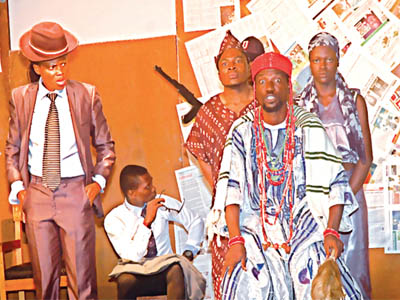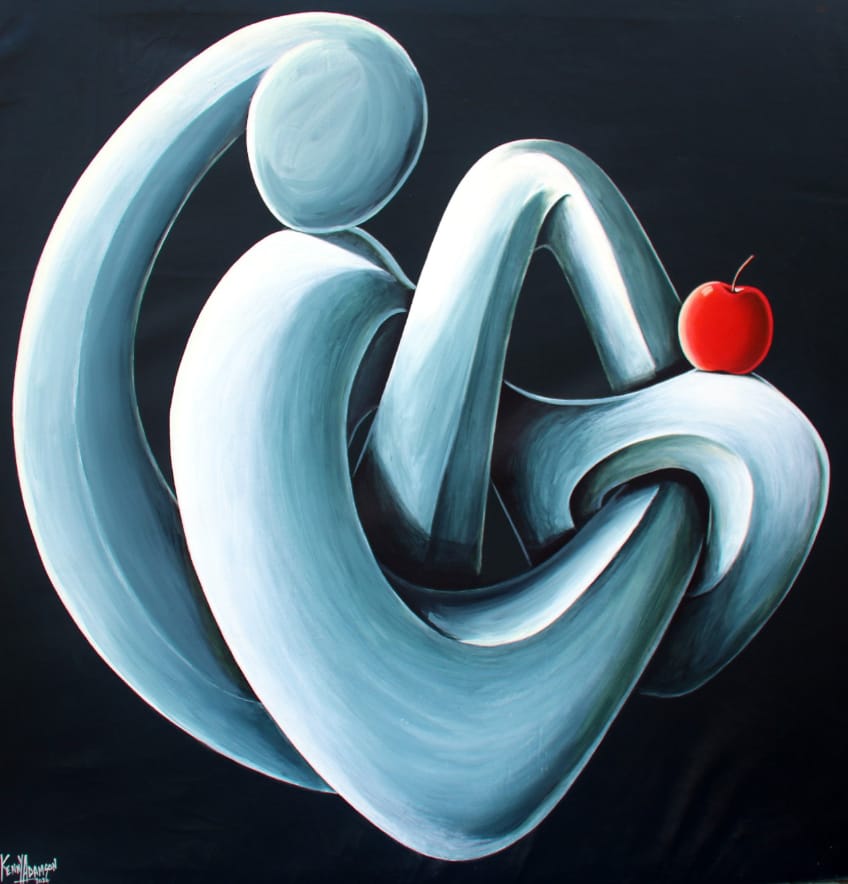 The issue of tyranny and bad leadership across the African continent, including the traditional stools which are government at the grassroots, was brought to the fore last Sunday to thrill theatre lovers in a live performance titled, Kongi’s Harvest. The play was a presentation of Crown Troupe of Africa to mark its 19 years of stage performance and as part of events to celebrate the 81st birthday of Nobel laureate, Prof. Wole Soyinka, who incidentally wrote the play.
The issue of tyranny and bad leadership across the African continent, including the traditional stools which are government at the grassroots, was brought to the fore last Sunday to thrill theatre lovers in a live performance titled, Kongi’s Harvest. The play was a presentation of Crown Troupe of Africa to mark its 19 years of stage performance and as part of events to celebrate the 81st birthday of Nobel laureate, Prof. Wole Soyinka, who incidentally wrote the play.
It opens with the people of Ismaland caught in sombre and pessimistic mood because their spiritual leader, Oba Danlola, is in preventive detention, with the people agonising over the acts of the political leader Kongi; they never expect any good from his administration.
Kongi, the self-imposed political leader of Ismaland, insists that Danlola should only be seen at the New Yam festival, where he would bring the sacred yam with his own hands to him. Kongi has put Obas Sarumi and Danlola in detention, as a way of depriving them of their traditional power. The two kings are strong opponents of Kongi; they never liked him for his tyrannical and oppressive rule. To curtail their opposition, Kongi employs the machinery of governance to arrest and incarcerate the two kings. With his enemies put under control, Kongi plans to use the New Yam festival, a festival highly venerated by the people, to make Danlola relinquish his kingship to him. It is also meant to launder his image. But he does not want to raise any dust over it; he wants to make it appear as if Oba Danlola relinquished power without compulsion. If Danlola hands Kongi the new yam during the festival it would mean Kongi would not only be the political leader of the people, but also the spiritual one.
To make things work in his favour, Kongi engages the services of a fraternity of Aweris and the ubiquitous organising secretary supported by a brutal Carpenters’ Brigade. However, despite efforts to achieve his ill-conceived plans, his former mistress Segi challenges him both in private and in the open.
Danlola gets to know of the plan; this makes him resolve not to relinquish his religious functions to anyone. Knowing his stand Segi and Daodu persuade him to play along to draw Kongi to the public celebration where he would be assassinated.
The counterplan works, but the assassination plot fails and Segi’s father is killed instead. Later, when Kongi discovers the counterplan, he chases away Daodu, the heir apparent of Danlola and Segi and asserts himself more repressively.
The play is divided into four sections; ‘Hemlock’ is the prologue. It tells how Oba Danlola tries to save Ismaland and the people from Kongi’s anarchy. It also warns of future political instability and the despondency the people would face in Kongi’s regime. The first section lead into the belly of the play; it unveils the story in stages while the hangover is the epilogue.
The play is a satire on contemporary political situation in most African countries, including Nigeria, where most political office holders, rather than serve the people, see public funds as private treasures to be looted. They steal and enrich themselves and their family members with public funds at the expense of those who put them to power.
Projecting multifaceted themes such as intrigues, corruption, statesmanship, putting self above the state, ego and other devious human frailties, Kongi’s Harvest depicts Kongi as a modern dictator suffering extremes of paranoid. Like all dictators, Kongi engenders and spreads destruction; he decapitates his opponents and shows no genuine interest in the New Yam festival, the fertility rites of passage for all flora and fauna, including man in the land of Isma.
Kongi maintains total control over all the instruments of coercion, which are well established and manifested in the mallet-swinging Carpenter Brigade and in the Superintendent, who torments Oba Danlola.
Direction is from Segun Adefila, who used songs and dance to keep the audience in their seats in a performance lasting over two hours. The songs are not only relevant they partly tell the story and serve to change the scenes. Adefila showed ingenuity by casting a lady, Joy Akra, as the organising secretary, to play the role of a man. Akra’s body language, fluent delivery and her role interpretation further added colour to the performance. Indeed, she was the star attraction. And as Kongi’s Harvest will be staged again today at the same venue, the audience should look out for another good performance from her. The costumes were also on point, as they did not typifying only Isma but any community in Nigeria or Africa.
However, projection was not good enough, as the actors didn’t project their voices to be heard in the small hall. This made listeners to strain themselves or imagine what was being said. Apart from this, this was another Crown Troupe’s superlative performance. The audience lingered a little while longer even after the two hours 15 minutes the play lasted.
Those who missed Kongi’s Harvest last Sunday has another chance to make it, as the play will again be presented today at Terra Kulture.






